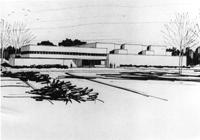
Mission, Vision, and History
Mission
NC State Continuing and Lifelong Education is a key strategic leader, catalyst and partner in the development and delivery of market-driven continuing and lifelong education programs and services to benefit individuals, organizations and communities at all stages of their personal and professional development.
Vision
Positively impact the individuals, organizations and communities of North Carolina, the nation and the world through the development and delivery of market-driven continuing and lifelong education programs and services.
Values
- Strive for Excellence: We strive for excellence in all we do, including hiring highly-qualified staff, and developing and delivering exceptional programs and services to meet the needs of our clients and partners.
- Embrace Diversity and Inclusion: We champion an inclusive and welcoming work environment that focuses on our employees’ well-being.
- Champion Honesty, Integrity and Respect: Above all else, our work will be accomplished with the highest level of transparency and professionalism, that is always conducted ethically and with respect for our colleagues, clients and partners.
- Embrace a Culture of Change and Innovation: Leverage partnerships and university (scholarly and research) expertise to make thoughtful, data-informed decisions which enable innovative ideas. We are curious and open-minded; we ask bold questions, and try new approaches without fear of failure.
History of NCSCaLE and the McKimmon Center
NCSCaLE’s origins date back to 1924 with the establishment of the College Extension Division. Instrumental to the division’s flourishing was Dr. Jane S. McKimmon (1867-1957), a pioneer in the field of continuing education. Dr. McKimmon served for 35 years (1911-1946) as a leader in home demonstration work, and received many honors for her outstanding direction of youth and adult extension education in North Carolina.
To honor her commitment and contributions to continuing education and access for all, the College Extension Division was eventually renamed the McKimmon Center for Extension and Continuing Education, and the newly-constructed campus building that has housed the division since 1978 was named the Jane S. McKimmon Conference and Training Center.
The McKimmon Conference and Training Center is a hub of activity encompassing a wide array of learning opportunities, professional meeting facilities, and university services–serving over 95,065 participants in approximately 1,269 education programs, courses and events during the 2021-2022 fiscal year.
In July 2022, in order to more closely align with the university’s strategic plan as well as its own guiding mission, the division was renamed NC State Continuing and Lifelong Education (NCSCaLE). Committed to honoring Dr. McKimmon’s ideals and legacy, the name of the building remained the Jane S. McKimmon Conference and Training Center.
NCSCaLE staff remain dedicated to sharing the university’s knowledge, resources, and providing excellent customer service. Through partnerships, creative programming, dynamic member opportunities, and a comprehensive range of applied research and technical assistance, you will find the solutions to your continuing education, professional development, meeting facility, and public policy needs.
Jane Simpson McKimmon
 Jane Simpson was born in Raleigh on November 13, 1867. She was one of eight children born to William and Anne Cannon Shanks Simpson. She graduated from Peace Institute when she was 16 and married Charles McKimmon when she was 18.
Jane Simpson was born in Raleigh on November 13, 1867. She was one of eight children born to William and Anne Cannon Shanks Simpson. She graduated from Peace Institute when she was 16 and married Charles McKimmon when she was 18.
Jane S. McKimmon served as state director of the women’s division of the Farmers Institutes from 1908-1911. In 1911, Dr. I.O. Schaub encouraged her to accept the position as the first NC state home demonstration agent (one of only five in the nation). When she accepted this position the total enrollment of home demonstration work was 416 white farm girls in 14 counties; 30 years later, the enrollment included 75,000 people (both white and black) in 100 counties. Under McKimmon’s direction, Tomato Club Girls grew and canned a commercial product of excellent quality – thus, NC clubs were the first in the country to put standard packs on the market. This helped to open the eyes – and pocketbooks – of many county commissioners who had refused to see the necessity of such “frills” as home demonstration work. McKimmon retired from home demonstration work in 1937 but continued to serve as assistant director of the NC Agricultural Extension Service from 1924-1946.
Several NC governors recognized Jane S. McKimmon’s outstanding leadership and organizational skills. In 1917, Governor Bickett named her director of home economics to help direct the WWI food program. Governor Ehringhaus appointed her on the board for the first State Rural Electrification Authority in 1935. In 1937, Governor Hoey made her vice-chairman of the board. Governor Broughton appointed her to the board of directors of the State Farmers Exchange in 1941. The latter governors also made and kept her as a member of the State Council of National Defense during WWII.
 McKimmon was a big proponent of continued education. After she was 50 years old, she earned a B.S. degree from State College in 1926 and an M.S. degree in 1929. In 1934, she received an honorary LL.D. from the University of North Carolina in recognition of her outstanding contribution to the educational field in organizing and setting a pattern which brought home demonstration work to its present efficiency. She also insisted on further education for extension agents. From 1916 on, she planned two-week short courses that provided a 30-hour unit course for agents. She helped organize the State Home Economics Association which includes high school and college students, extension agents, and business leaders. In 1966, $100,000 in “butter and egg money” was presented to State College from about 40,000 Extension Homemaker Club members. This was to initiate funding for the Jane S. McKimmon Extension Education Center. The purpose of the building was to provide space for short courses and conferences and headquarters for the University’s Extension and Public Service Division.
McKimmon was a big proponent of continued education. After she was 50 years old, she earned a B.S. degree from State College in 1926 and an M.S. degree in 1929. In 1934, she received an honorary LL.D. from the University of North Carolina in recognition of her outstanding contribution to the educational field in organizing and setting a pattern which brought home demonstration work to its present efficiency. She also insisted on further education for extension agents. From 1916 on, she planned two-week short courses that provided a 30-hour unit course for agents. She helped organize the State Home Economics Association which includes high school and college students, extension agents, and business leaders. In 1966, $100,000 in “butter and egg money” was presented to State College from about 40,000 Extension Homemaker Club members. This was to initiate funding for the Jane S. McKimmon Extension Education Center. The purpose of the building was to provide space for short courses and conferences and headquarters for the University’s Extension and Public Service Division.
In 1945, Dr. McKimmon published the story of the home demonstration course growth in her book, “When We’re Green We Grow.” In May of 1949, her work was dramatized on the National Broadcasting Company’s 30-minute weekly program, “Cavalcade of America.” Jane S. McKimmon died at the age of 90 on December 1, 1957. This quote from “When We’re Green We Grow” sums up her opinion of the progress of home demonstration work: “There wasn’t much cash in the North Carolina farm home in the early nineteen hundreds. There isn’t much now. But there is a different attitude on many farms toward what constitutes wealth on the farm, and different methods of making it serve the farm family.”
Helen Eure. “Jane Simpson McKimmon: apostle of richer life to the rural women of N.C.”